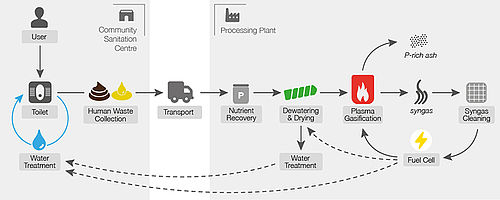Process & Energy - Reinvent the Toilet
Together with the Faculty of Industrial Design Engineering (IDE), the Faculty of Mechanical Engineering (ME), is participating in the Reinvent the toilet challenge, funded by the Bill & Melinda Gates Foundation. The goal of the challenge is to develop a radical solution that provides improved sanitation to more than 2.6 billion people on Earth that still lack access to safe and affordable sanitation.
Delft University of Technology proposes Microwave Plasma Gasification to generate electricity out of feces. Human waste is dried, converted to syngas and fed into a fuel cell. The gasification process destroys pathogens immediately and generates enough energy to power the system, creating a sustainable cycle. This is an efficient method to get rid of large amounts of feces, while at the same time generating enough electricity to make the system self-supporting. A possible surplus of energy can be used to provide additional services to the community. Other resources that can be recovered out of the collected human waste are nutrients such as phosphate, which is a valuable fertilizer due to the increasing scarcity of its natural reserves. Water can be purified and recycled so that it can be reused for hand washing or flushing. Ultimately, this system is a fully stand-alone entity that has no electric utility connection, no (heavy) reliance on piped-in water and no connection to any type of sewerage.
The following diagram shows a systems overview. Our Process & Energy team focuses on the right part of the diagram.

Integration experiments
In March 2014, the 3ME - team has successfully integrated a plasma gasifier with a gas cleaning system and fuel cell:
Scientific articles
- P.V. Aravind and Wiebren de Jong - Evaluation of high temperature gas cleaning options for biomass gasificationproduct gas for Solid Oxide Fuel Cells.
An analysis of high temperature gas cleaning systems for cleaning the product gas of biomass gasification for fueling solid oxide fuel cells (SOFCs) is presented in this article. Influence of biomass derived contaminants on SOFCs is briefly presented and the removal of potential contaminants such as tar, particulates, H2S and HCl, alkali compounds from biosyngas is reviewed. It appears that the gasification product gas can be cleaned to meet the requirements of SOFCs based on Ni/GDC anodes at high temperatures (typically in the range of 1023e1223 K) by using currently known gas cleaning methods. Although information from literature, results from chemical equilibrium studies and preliminary experiments were sufficient to put forward a conceptual design for a high temperature gas cleaning system, detailed experimental inves-tigations are still required. This is needed to obtain detailed information on contaminant tolerance of SOFCs, and to arrive at detailed designs of gas cleaning units that are economically viable for biomass gasifier-SOFC systems. The full article can be found here. - M. Liu, T. Woudstra, E.J.O. Promes, S.Y.G. Restrepo, P.V. Aravind - System development and self-sustainability analysis for upgrading human waste to power.
This paper presents a system to upgrade faecal matter in an environmentally friendly way by the deployment of plasma gasification and SOFC (solid oxide fuel cells). The entire system chain, including a dryer, a microwave-assisted plasma gasifier, a gas processing system and an SOFC system, is studied to evaluate system performance and self-sustainability. The effects of gas processing approach, moisture content and oxidant-to-fuel ratio on system self-sustainability are studied in detail. The results show that the variables aforementioned strongly affect system performance. It is recommended to deploy the approach of adding air, a mild moisture content (30% by weight) and an intermediate oxidant to fuel ratio (1.05 kg kg−1) to achieve enhanced system performance under the conditions studied. The full article can be found here.
Dr. P.V. Aravind
- +31 15 27 83550
- P.V.Aravind@tudelft.nl
-
Room 1-430
Building 46
Leeghwaterstraat 44
Researchers
Dr. P.V. Aravind
Dr. Wiebren de Jong
Dr. Georgios Stefanidis
Dr. Guido Sturm
Dr. Xiang Mei Meng
Dr. Ming Liu
Dr. Sandra Y. Giraldo
Eva Promes, MSc.